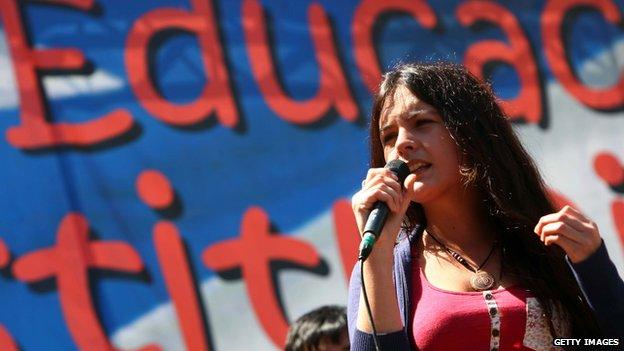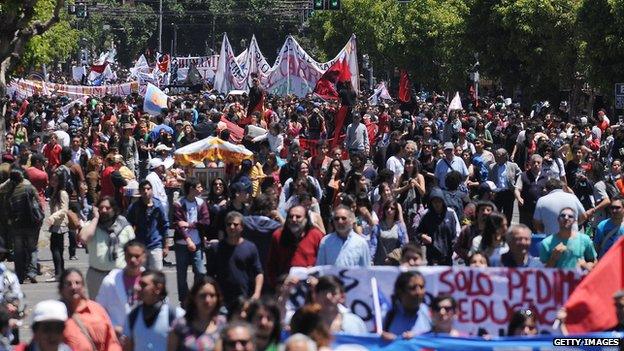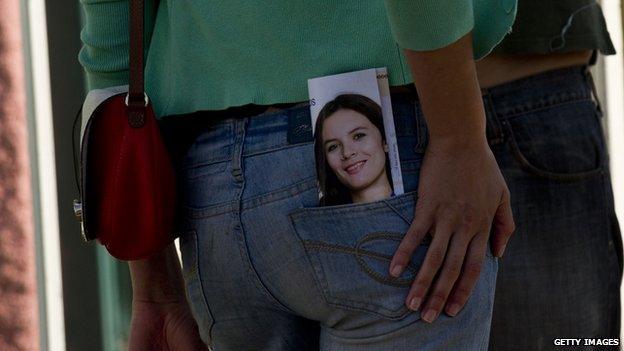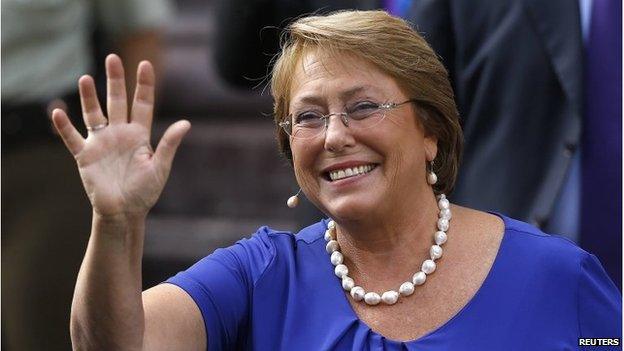Chile's student leaders come of age
- Published

Camila Vallejo led mass student protests demanding education reform
When she first came to public prominence in 2011, Camila Vallejo was the poster child of Chile's student protest movement.
Articulate, forceful and attractive, she was hailed in the international press as the archetypal glamorous Latin American revolutionary.
For Spain's ABC newspaper, she was a "Chilean Che Guevara". In Britain, the Guardian compared her to Mexico's Zapatista leader Subcomandante Marcos.
Fast-forward three years and Ms Vallejo is still in politics, but these days she is preparing for parliament rather than the barricades.
On Tuesday, Ms Vallejo will take her seat in the Chilean congress after winning an emphatic victory in last November's parliamentary elections.
Standing for the Communist Party, she won 44% of the vote in the Santiago district of La Florida.
And Ms Vallejo will not be alone.
Three other former student leaders will also be sworn in as members of parliament. All are in their 20s. Ms Vallejo, at 25, will be the youngest member of the new congress.
Powered by protest
It is a remarkable achievement for a group of activists who no-one had heard of at the time of the last government handover in 2010.

Mass rallies demanding education reform drew tens of thousands of people to the streets of Chilean cities
A year after that, Chile's students took to the streets demanding sweeping education reform. Some of their marches brought more than 100,000 people on to the streets of Santiago.
They were the biggest protests in Chile since the return to democracy in 1990 after 17 years of dictatorship under Gen Augusto Pinochet.
Invariably, Ms Vallejo was at the head of those marches, accompanied by Giorgio Jackson, the other main student leader of that year.
.jpg)
Giorgio Jackson says growing up in a democracy has changed the outlook of the younger generation
He too will become a member of congress on Tuesday after taking 48% of the vote in his constituency in central Santiago.
"We have a different story from other people in this parliament," Mr Jackson told the BBC on the eve of the handover.
"Our story is about being born in the last years of the Pinochet dictatorship. We were raised in democracy, and that immediately changes your expectations about what democracy is.
"For people who are now in their 60s and 70s, the transition from dictatorship to democracy was a huge achievement in itself. They're happy with that.
"But our generation wants to push the limits and take things further forward. We don't feel comfortable with the status quo."
Communists in power
Mr Jackson, 27, will enter parliament as an independent, as will another of the former student leaders, Gabriel Boric, 28.
Ms Vallejo and the fourth of the former students, Karol Cariola, 26, will represent the Communist Party.

Some have accused Ms Vallejo of "selling out" by running for congress
The Communists will be part of the governing coalition led by Michelle Bachelet, who was president from 2006 to 2010 and who was re-elected for a second term in December.
In response to the student demonstrations of the past few years, Ms Bachelet has put education reform at the heart of her plans for government.
For some within the student movement, Ms Vallejo and Mr Jackson have sold out to the political establishment by entering congress.
But Ms Vallejo describes it as "a necessary step to make sure the demands of the street are heard" and Mr Jackson says that most of the students appear to support their decision.
As an independent, he says he will offer "critical collaboration" to the Bachelet government, supporting it only when he sees fit.
Aside from education reform, the student leaders say they will press for a constituent assembly to draw up a new constitution.
They also want a new electoral system, greater recognition for Chile's indigenous minorities and economic policies aimed at closing the yawning income gap between Chile's rich and poor.
Rich in symbolism
Tuesday's government handover is likely to be a highly symbolic affair.

Michelle Bachelet will serve a second term in office after she became Chile's first female president in 2006
Ms Bachelet, who made history by becoming Chile's first female president when she first took office in 2006, will become the first president in over half a century to return for a second term.
Isabel Allende, the first female president of the Chilean senate, will place the red, white and blue presidential sash around Ms Bachelet's neck. It will be the first time in the country's history that one woman has passed the sash to another.
The personal stories of both women are inextricably linked to the military coup of 1973 and the dictatorship that followed.
Ms Allende is the daughter of Salvador Allende, the Socialist president deposed by Gen Pinochet, while Ms Bachelet's father was an air force officer who was charged with treason after the coup and who died in custody after being tortured.
"Symbolically it's very potent," said Ms Vallejo, who insists human rights and gender equality have to be top priorities for the new government.
Three years after she entered the public arena, Ms Vallejo is now a mother. She will take her young daughter to congress in the port city of Valparaiso for Tuesday's ceremony.
"Adela goes everywhere with me," she told reporters on the eve of the change of government.
"I want to be able to tell her when she's older that she was there with me for the handover of power."
- Published16 December 2013
- Published16 December 2013
- Published11 April 2013